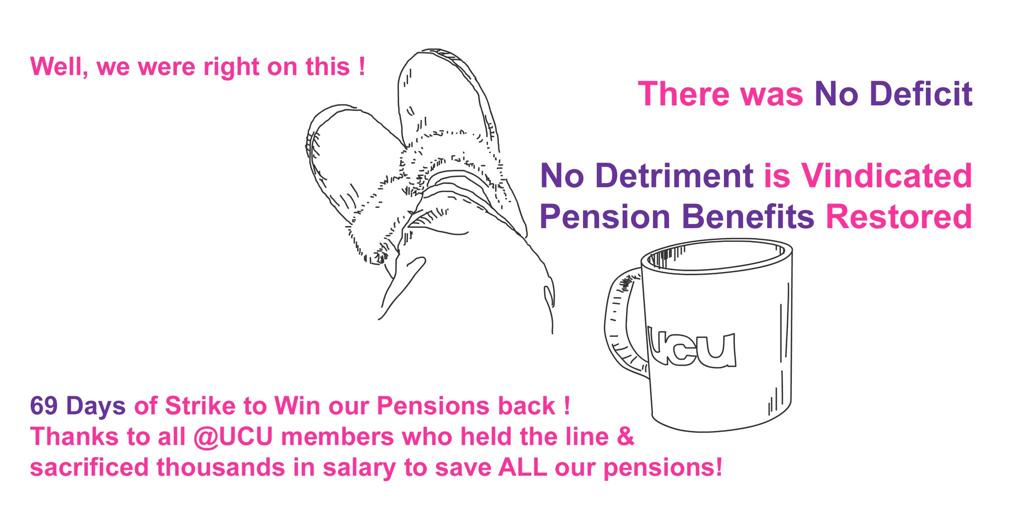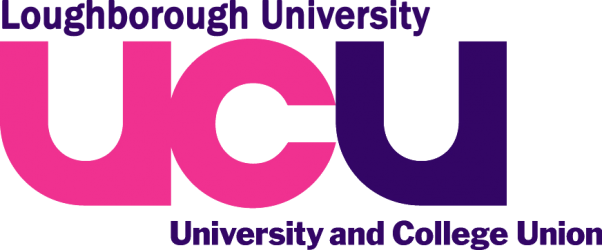USS Consultation – how we can act to restore our pensions
The following article is long, but very important if we are to secure the restoration of our pensions. We are extremely close to finalising this win, but we are not there yet. Please read the information below and respond accordingly to the USS member consultation, to ensure the changes we want go ahead. In the red text boxes below, you will find UCU’s suggested considerations when you fill out your own consultation form. Further details on how to complete the USS Members Consultation can also be found towards the bottom of this article.
Additionally, we share details of the response Loughborough University is making to the employer’s consultation.
Members’ Consultation
USS has launched a consultation with members about the future of the scheme, and in particular what level of benefits members would like to receive. It is important that as many members as possible feed their views into this consultation to strengthen our negotiators’ position.
Please note that it is essential for members to respond individually to this consultation, because in previous consultations, where members cut and pasted a set of responses, we know that these were disregarded by USS and UUK.
Below, we have provided explanations regarding the changes to help you understand the questions and, in white text on red backgrounds, suggestions to help you formulate your own responses. The consultation includes questions on the issues that are highlighted below in bold, and there is an opportunity to make additional comments. There is not a question that asks specifically whether you support a contribution rate of 20.6% versus UCU’s preferred 26% rate.
Please consider recommending a rate above 20.6% in the comments box to help our negotiators gain agreement from Employers to adequately support their employees’ pensions – instead of using the review of USS as a mechanism for reducing their costs. Employers reducing contribution rates too far dramatically increases the risk of future valuations leading again to benefit cuts, necessitating further industrial action, and repeating the exhausting cycle we have seen in recent years.
Salary threshold increase
You build up benefits in the defined benefit part of the scheme, the USS Retirement Income Builder, on your salary – up to the salary threshold. If you earn above the salary threshold, you’ll contribute to the defined contribution part of the scheme, the USS Investment Builder too.
From 1 April 2022, the salary threshold was reduced from £59,883.65 to £40,000, and the inflation cap on the annual increases applying to that threshold was changed from 10% to 2.5% (as described below). If the April 2022 changes had not taken place, it is likely that the salary threshold would currently be around £66,400.
At the moment, the salary threshold is £41,004, and it increases every year in line with Consumer Price Index (CPI) inflation to a maximum level capped at 2.5%.
It’s proposed that, from 1 April 2024, the salary threshold increases to between £66,400 and £73,040 (the final level to be determined by the rate of CPI inflation to September 2023) and that annual increases continue in line with CPI inflation but to a higher cap of 10%, applied as follows:
- Where CPI inflation is 5% or less, the increase is matched.
- Where CPI inflation is more than 5% but less than 15%, the increase will be 5% plus half of the percentage increase above 5%.
- Where CPI inflation is 15% or more, the increase applied shall be 10%.
This change would broadly put the salary threshold at the level it would have been were it not for the 1 April 2022 change, and would mean that a greater proportion of benefits is built up in the defined benefit part of the scheme, the USS Investment Retirement Income Builder, for members whose salary is higher than the current salary threshold. This also means that these members would build up less savings in the defined contribution part of the scheme, the USS Investment Builder. If a member’s salary is below the current salary threshold, the increase to the salary threshold will not impact that member’s benefits.
Please consider expressing support for an increase to the salary threshold at the level it would have been were it not for the 1 April 2022 pension cuts, and expressing support for a return to a 10% inflation cap in order to protect the value of our pensions.
Accrual rate increase
In the defined benefit part of the scheme, the USS Retirement Income Builder, you build up benefits at a rate of 1/85 of salary each year (up to the salary threshold) and 3/85 of salary as a lump sum received on retirement.
It’s proposed that, for benefits built up from 1 April 2024, the accrual rate will increase to 1/75 of salary and 3/75 of salary for the lump sum.
This change would re-introduce the accrual rate that was in place before 1 April 2022, and would mean that a higher rate of benefits would be built up in the defined benefit part of the scheme, the USS Investment Builder, than now.
Please consider expressing support for increasing the accrual rate to 1/75th of salary and 3/75th of salary for the lump sum.
Higher cap on future pension increases
In the defined benefit part of the scheme, the USS Retirement Income Builder, the benefits you build up each year are “banked” and increased before and after retirement in line with Consumer Price index (CPI) inflation subject to a cap of 2.5% (deferred to 1 April 2026 but applying to benefits built up from 1 April 2022).
It’s proposed that the cap increases to a maximum of 10%, to be applied as follows to benefits built up from 1 April 2022:
- Where CPI inflation is 5% or less, the increase is matched.
- Where CPI inflation is more than 5% but less than 15%, the increase will be 5% plus half of the percentage increase above 5%.
- Where CPI inflation is 15% or more, the increase applied shall be 10%.
This change would re-introduce the cap on increases that was in place before 1 April 2022, and would mean that the more benefits built up in the defined benefit part of the scheme, the USS Retirement Income Builder, the higher the rate of inflation protection applied to them would be, if inflation is higher than 2.5%.
Please consider expressingsupport for a return to the cap on increases that was in place before 1 April 2022, to a maximum of 10%, in order to maximise the protection to our pension values.
Contributions above the salary threshold to the defined contribution (DC) part of the scheme, the USS Investment Builder
Currently, 20% of your salary above the salary threshold (8% from your contribution above the salary threshold and 12% from your employer) is paid in to the defined contribution part of the scheme, your USS Investment Builder.
Whilst it is proposed that the overall 20% of salary above the salary threshold to the USS Investment Builder remains unchanged, the JNC will confirm, later in the year, whether the proposed share of member and employer contributions within that 20% will change. The JNC will determine this share of contributions into the DC part of the scheme, the USS Investment Builder based upon the overall rate determined by the Trustee for the benefits proposed.
Please consider expressing support for employers’ continuing to payat least the current 12% rate of contributions, rather than reducing their contribution rate in favour of members paying a greater percentage into the DC part of USS.
Completing the USS Member Consultation
You may complete the USS members consultation form here: Log in – Member – USS Consultation 2023. To access the form, you will need you USS member number and your national insurance number. This consultation closes on 24th November.
Employers’ Consultation
We are pleased to report that branch officers had two meetings with senior managers to discuss their response to the USS Employer Consultation prior to producing the statement below. They have agreed to share it with UCU members in the interest of transparency.
Please find below the statement that Loughborough University has sent to USS as part of the Employers’ Consultation, where they provide their views on a resolution to the pension dispute.
We are broadly supportive of the assumptions in the valuation but would welcome further consideration of specific elements. Whilst the valuation, and likely outcomes, are positive, on-going work streams and the subsequent Investment strategy review may potentially be limited by the decisions made at this stage, and we would therefore like to see prudence in utilisation of the surplus in order to maintain headroom for future decisions.
We support the return to pre-April 22 benefits, with contributions of 14.5% and 6.1% for employers and employees, respectively. We would support the surplus being used to provide additional stability for future valuations and contribution rates – for clarity, we mean we do not support further contribution rate reductions at this stage given there is still medium-term uncertainty. However, whilst we do not support a rate above 20.6% at this stage, we would not assume that any changes introduced by the on-going stability workstream would be funded by immediate recourse to benefit reductions i.e. we would consider some increase in rate, ahead of benefit reduction, should clear stability measures be needed and agreed.
We would support augmentation of benefits if these can be applied equitably and simply, and understand actuarial work has been carried out to cost options in this space. We would welcome swift resolution of the 2022 triennial valuation process to reduce contributions as early as possible for colleagues and institutions, with January 2024 being theoretically achievable, this taking priority over augmentation if necessary.
The enhanced covenant support measures can have a significant impact on employers, and we would welcome consideration on how this could be mitigated in light of this positive valuation. For example, what would the impact be of giving more headroom in the debt-monitoring/pari-passu metrics?
We are unclear why the confidence level has reduced from the level in the 2020 valuation, which was described as being the limit of regulatory compliance. Nevertheless, we see this as a positive and reasonable change that the level has reduced to 70%/69%. We note this is still higher than that used in the 2017 valuation.
Whilst we welcome the impact of the self-sufficiency measure being reviewed as part of the stability workstream, we question whether the definition of self-sufficiency — particularly the requirement to permanently maintain a high funding ratio — is fully explained and justified and would suggest that UUK requests modelling which explores the impact of this condition (especially the extent to which it drives the relationship between gilt rates and the surplus/deficit).
LUCU welcomes this response from Loughborough. It aligns with the important principles that our UCU pension negotiators are arguing for on our behalf: the need for the pension scheme to move away from excessive prudence in its valuation methodology, a return to pre-2022 benefits, the restoration of benefits lost since 2022, and as early as practicable.
However, there is one important area where, following guidance from our USS pension negotiators, we depart from management’s response, and this concerns the level of contribution rates. While Loughborough management remains open to higher contribution rates should they be needed to secure fair pensions, they remain unconvinced that the future risk of a deficit means that higher contributions from employers are needed at this time. Consequently, they favour a total contribution rate of 20.6%. UCU negotiators are clear that a 20.6% contribution rate risks the scheme falling into deficit within c. 3 years, and USS agrees with this. For this reason, UCU negotiators want employers to commit to a higher contribution rate of 26%.
Although Loughborough management would not choose to prioritise benefit reduction over making higher contributions should a deficit arise, it is important for members to consider that there are hard-line VCs who may adopt this position if presented with a pension deficit. An overall contribution rate of 26% will ensure that the pension benefits we enjoyed before the cuts in 2022 can be restored and can be sustained in the longer term. Tremendous progress has been made on the pensions’ front thanks to members’ action, but we still don’t have a complete ‘win’ yet. We need to give our negotiators the backing to ask for higher contribution rates in order to ensure the sustainability of our pensions.
Even in the face of the cost-of-living crisis, we urge members to support the higher rate of contribution when they respond to the USS consultation: this will help avoid the need to re-fight the same battles to protect the value of our pensions in just a few years’ time. Though we too would be paying more into our pensions if the contribution rate is set at 26%, we would still be paying less into our pensions than we do currently and for much better benefits.
Please feel free to share this communication with your colleagues who are not members of UCU, because it is vital that all members of USS are informed about the consultation and the importance of engaging with it.
Thank you,
LUCU Committee



